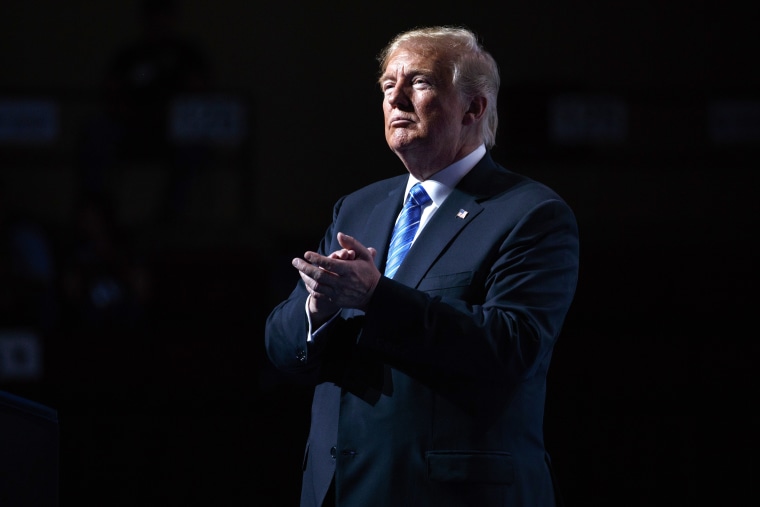INDIANAPOLIS — Republican lawmakers want you to know they are very, very upset about President Donald Trump’s decision to shower $12 billion in subsidies on farmers hurt by foreign countries’ retaliatory tariffs on U.S. goods.
“It’s problematic to say the least,” Agriculture Committee Chairman Pat Roberts, R-Kan., said Tuesday.
The president’s tariff-and-subsidy policy is “incoherent,” said Sen. Bob Corker. R-Tenn.
The bumper crop of cash is “an additional payment that’s going to be made by the taxpayers,” said South Dakota Sen. John Thune, a member of the GOP leadership.
But perhaps Capitol Hill doth protest too much.
What Trump has done with a wave of his hand is allow conservatives to retain purist positions against tariffs and subsidies with less fear that GOP candidates will be punished by aggrieved farmers in the midterm elections.
The Trump bailout is a lifeline for Republicans who were faced with the treacherous choice of letting farmers suffer or criticizing a president who is immensely popular among their constituents. The upside is less pain for farmers. And there's no realistic downside risk of Trump alienating his supporters because they see the move as too nakedly political or ideologically abhorrent.
If it works, he’ll have diminished the chances that his tariffs will cost Republicans control of the Senate. With the GOP hoping to pick up seats in a series of states dependent on agriculture — including Indiana, Missouri, Florida, Montana and North Dakota — that’s no small thing.
On a conference call with reporters Tuesday, administration officials said they expect the infusion of money to be a one-time shot that will not extend into next year. Read another way, that means $12 billion for farmers in an election year — and nothing once they’ve voted.
In the long run, Trump said in a speech to a Veterans of Foreign Wars convention in Kansas City, “farmers will be the biggest beneficiary” of his tariff fights with other countries. With billions of dollars headed their way as soon as Labor Day, they’re the biggest beneficiaries in the short term, too.
Or at least, the intention is to use tax dollars to keep voters on board, after Trump created the tariff problem by slapping levies on foreign goods — inviting midterms payback from what should be his political base.
In an interview just before the subsidy plan was made public, Indiana Senate Republican nominee Mike Braun said he was willing to give Trump latitude on his effort to force other countries to make better trade deals with the U.S., even if it means some short-term pain for the agricultural sector.
“I think even farmers that are now having the retaliatory part of it aimed at them are willing to let this play out,” Braun said. “And I think we’ve got to be smart enough to make sure that any certain sector of our economy is not disproportionately paying the price for trying to fix some of these embedded inequities.”
Asked whether that meant he supported subsidies, Braun said it did not.
“That would be something I wouldn't be for,” he said.
But on Wednesday, after learning of the new White House policy, Braun sent a statement to NBC News saying he supports Trump's subsidies.
"President Trump is making good on his promise to fight bad trade deals and I applaud him for listening and working to offset China’s retaliation against our farmers," he said. "President Trump is firmly behind our farmers as he works to create better deals and put America first.”
Ultimately, Trump’s plan allows most GOP lawmakers and hopefuls to have it both ways: They can complain about the tariffs and subsidies to donors and voters who hate them, while reaping the benefits of a policy that requires no congressional action.
If they were really determined to stop Trump, GOP lawmakers could act to block the subsidies. But with the president riding an 88 percent approval rating among Republicans and rural voters feeling the hard economic pinch of foreign tariffs, there’s little likelihood of such a rebuke.
By now, it comes as no surprise that Trump parts with Republican orthodoxy on trade — it’s one of the reasons he was able to pick up support from some independent voters and Democrats in industrial states in his 2016 campaign.
The split was evident when he first announced he would put tariffs on steel and aluminum earlier this year, and it was even more pronounced on Tuesday when he signaled that his salve was the kind of subsidies Republicans have been fighting to remove from the federal budget for years.
Conservatives just don't like federal spending or barriers to free trade.
And few Republicans think two ideological wrongs make the right policy.
"Tariffs are taxes that punish American consumers and producers," Sen. Rand Paul, R-Ky., wrote on Twitter. "If tariffs punish farmers, the answer is not welfare for farmers — the answer is remove the tariffs."
But in the short term — the only window that matters for the midterms — the subsidy solution to Trump's tariff problem just might make for good politics.

